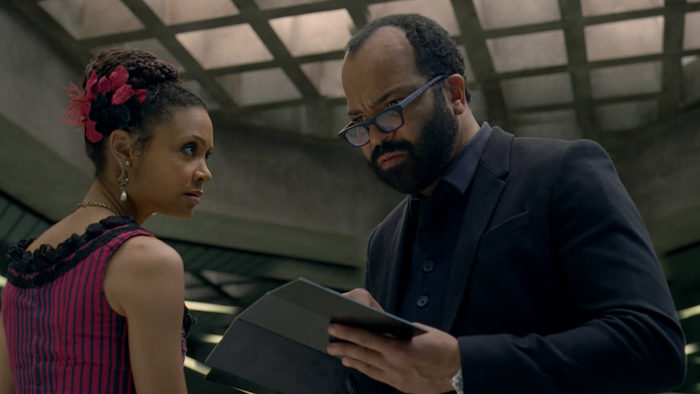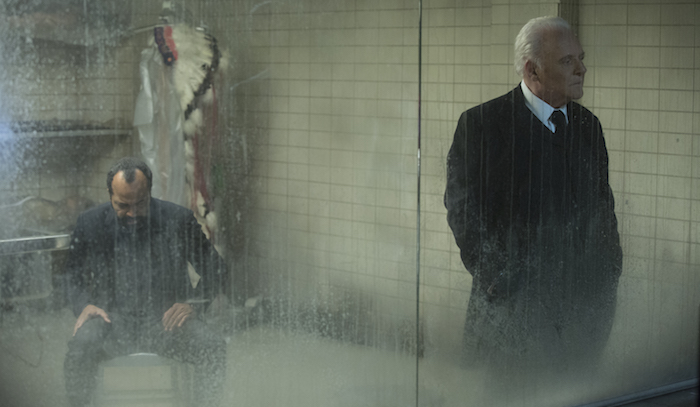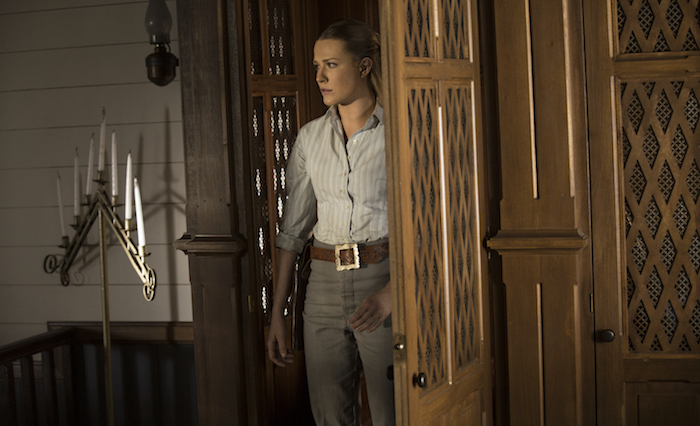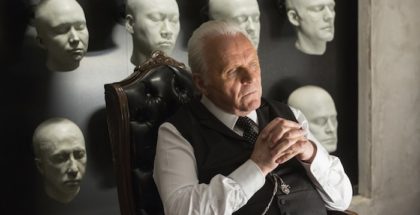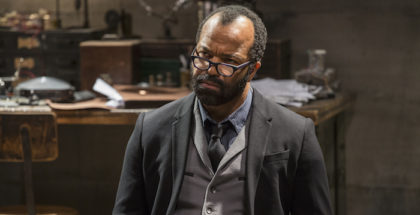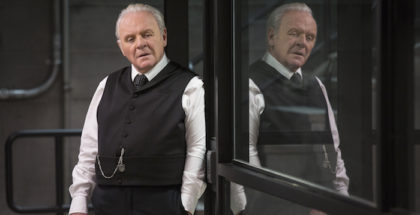UK TV review: Westworld Episode 9 (The Well-Tempered Clavier)
Review Overview
Past
8Present
8Future
8David Farnor | On 04, Dec 2016
Warning: This contains spoilers. Not caught up with Westworld? Read our spoiler-free review of Episode 1.
When Westworld began, the worry was that there would be little beneath its impressive surface, not enough answers to satisfy its questions, not enough surprises to live up to audience speculation. If Episode 8 was a reassuring demonstration that we were in safe hands, Episode 9 confirms it beyond all doubt.
The penultimate chapter of the show’s stunning first run is yet another hour confirming a host of fan theories – and yet another hour in which having our expectations met isn’t disappointing, but actually thrilling.
Part of the reason for that remains the cast, not least Jeffrey Wright, whose turn as Bernard Lowe has been fantastic. Or should we say, Arnold. Because yes, after seeing his mind blown in Episode 8 by the discovery that he’s a robot, Episode 9 sees Bernard’s since-erased mind blown once again by the same discovery – and again, by the further discovery that he’s a robot replicant of Robert Ford’s (Anthony Hopkins) old partner. We’re not shocked by this at all – “Arnold Weber” is, in fact, an anagram of “Bernard Lowe”, for all the “I Am Lord Voldemort” spotters out there – but it’s a treat nonetheless to see just how shocked Bernard is, a sign of how well constructed these characters are.
Bernard’s second revelation comes courtesy of Maeve, who, it turns out, can now control him using her voice. (Any doubts about her sudden ability to do so are easily offset by the surprise that she can, something that Thandie Newton’s performance manages to sell as just another example of how intimidating her host is.) It’s Maeve who sends Bernard running to Ford to find out answers about his identity and past, demanding to be sent back into his own memories – which is where he unearths the very real source of such convincing flashbacks about his (or, should we say, Arnold’s) dead son. It also confirms our suspicions that Bernard definitely did kill Elise, under Ford’s instructions, and that Ford wiped his memory after that too.
It’s a revelation that’s also satisfying because it makes logical sense, if you follow Ford’s deceptively emotional version of logic. Ford, we’ve already learnt, likes to cling to his past as much as everyone else – whether human or host, history remains a universal lynchpin of identity – and for all his unsentimental attitude towards the robots, making them sit naked while being repaired to make it clear they’re not human, he has a fondness for creating mechanical mementoes to re-live out his own life and former relationships. Even his supposedly bold, new narrative for the park is merely revisiting old ground, with Wyatt and Arnold connected on some level.
The chance to see both acting titans square off against each other, with no more secrets between them, lives up to its long-anticipated billing. Hopkins’ Ford is better than ever, at once proud of his creation yet also aware that it can’t climb any higher without having to be stopped. He’s oddly caring in the way he erases Bernard’s memories, and strangely vulnerable in the way he hoped Bernard might choose to take the proverbial blue pill, after knowing everything, but he’s also calculating and cruelly manipulative. His rebirth of Arnold as Bernard comes from a place of warmth, but it’s inescapably cold, turning a friendship of equal footing into a master-servant dynamic, just so that Ford can retain some control. Hopkins’ maniacal glint as they spar verbally makes sure we don’t forget how ruthless he can be.
Arnold’s ideas still shine through, though, as Bernard ends up in the same position that Ford’s old partner reached: wanting freedom for the synths. Wright’s arrival at that point is great to witness, delivering a performance that swings between authority and inferiority. He demands Ford send him back into his memories to find the truth, but isn’t really in control; just as he hates and needs Ford, he hates and needs the reality of his memories; just as he reclaims his identity, he only reinforces his position as a creation of Ford’s. That becomes all too apparent when he modifies Clementine to get her to point a gun at Ford, only to discover that Robert still has control over them all anyway… including him. “Bye, old friend,” Ford smiles, as he orders Bernard to shoot himself in the head, before walking at the room – a denouement of genuine tragedy.
Bernard isn’t the only one going on a journey of discovery, though, and Westworld uses his memories to confirm, without spelling it out, the other main theory about the show: that The Man in Black is actually a 30-years-older William.
That’s all-but-guaranteed here, as we watch Logan tie William to a chair to talk some sense into him – after all, they’re about to become brothers-in-law, and William is busy falling in love with a robot, instead of Logan’s sister. Ben Barnes has been subtly excellent all season, giving us a despicable villain to dislike – and, sure enough, he lives up to that reputation by tying William to a chair and cutting open Dolores (Evan Rachel Wood) in front of him. What should we see but all those cogs and metallic bits that were typical of the original generation of hosts, not the sleek, modern-day mechanics that would be there, were this storyline taking place in the present?
It’s ok, Logan reasons: William has just fallen in love with Westworld in a different way to most, by wanting to play the hero and rescue a damsel in distress. But we see something more disturbing when Logan wakes up the next day: everyone around him murdered by William, the kind of act that’s more typical of The Man in Black than this young fellow. It’s an exhilaratingly ambiguous mix of nasty morals and noble intentions; William’s plot is, it seems, destined to be one of a descent into darkness, as he begins to live out the back-story involving his wife that The Man in Black described the other episode. After all, if Barnes’ loathsome chap is lost for words at the violence on display, William can’t be all that good.
Dolores and Will, meanwhile, manage to avoid falling into the western romance playbook: she points out that she doesn’t want to leave the park, but is being sucked into a narrative forced upon her by her would-be male benefactors regardless. All this means that basically since Dolores killed the man trying to assault her in the barn in Episode 3, we haven’t seen her fully in the present – her storyline is, it seems, mostly us watching her recall what happened with William all them years ago, a voyage to the white church that keeps cropping up in the present too, driven by Arnold’s voice inside her head, urging her on.
When she arrives at the church in what appears to be the modern-day, she hops in a lift down to Ford’s secret underground lab, returning us to the site of her conversations with Bernard – conversations that, we now presume, were actually with Arnold. The biggest shock? That she was the one who killed him. While we’re processing that, who should walk into the present-day church upstairs other than The Man in Black? That’s right: not William, because he’s in a timeline decades ago, and now, he’s all grown up. The question is: does he know her still? And does she know who he is? And who did do the killing all those years ago, which presumably led to Westworld’s almost closure and subsequent rescue by William? And what exactly is Arnold’s maze? And who is it meant for? (Ok, that’s more than one question, but you get the idea.)
Evan Rachel Wood, like Wright, continues to be an intriguingly enigmatic screen presence, her face hinting at hidden depths. There are depths, too, to James Marsden’s Teddy, who has flashbacks that seem to suggest he was either Wyatt’s right-hand man way back when, or that he was a sheriff doing the massacring all on his own. There’s still not 100 per cent clarity here, not least because of Marsden’s equally tricksy performance, but it’s a reminder of how clever the writing has been at wrong-footing us, never letting us fully trust what we’re seeing, especially when it involves memories.
“It’s a difficult thing, realising your entire life is some hideous fiction,” observes Maeve at one point. As the line between fiction and fact gets increasingly blurred, Westworld only becomes even more hideously magnificent. Indeed, part of the fun all along hasn’t been just guessing what’s going to happen, but admiring how the puzzle box is put together; hopping back and forth within Bernard and Dolores’ timelines, this episode puts their narratives side-by-side, without telling us exactly how they’re connected, until the breathless final moments.
And yet there are still strands of present and future that dangle tantalisingly in front of us.
The Man in Black escapes hanging by horse and rope, a death orchestrated by one of Riley’s hosts, so that she can kill him without breaking her prime directives – but he’s then confronted by Charlotte, who informs him of Theresa’s death and asks for his backing to oust Ford. He, though, is mostly indifferent about the politic games in play, as long as he can continue following Arnold’s clues uninterrupted. Maeve, meanwhile, continues to plan her uprising and hopeful escape, persuading Hector to “break into hell” with her – something she convinces him is a good idea, after a neat game of ‘predict the pre-programmed conversation’ and a fiery sex scene inside a burning tent (as you do). And, back in the control room, Stubbs decides to go looking for Elsie, but is captured by Ghost Nation hosts, who don’t respond to his voice commands – who are they? And who do they answer to?
Where will all those plot points lead, apart from violent ends? Westworld, up until now, has been relatively predictable but resoundingly rewarding to watch. Now, with one hour left to wrap up the season, we really don’t know what’s in store – and that only makes the show even more exciting.
Westworld Season 1 is available to watch on-demand through Sky Box Sets. Don’t have Sky? You can also stream it live and on-demand on NOW, as part of a £7.99 monthly subscription. A 7-day free trial is available for new subscribers.


